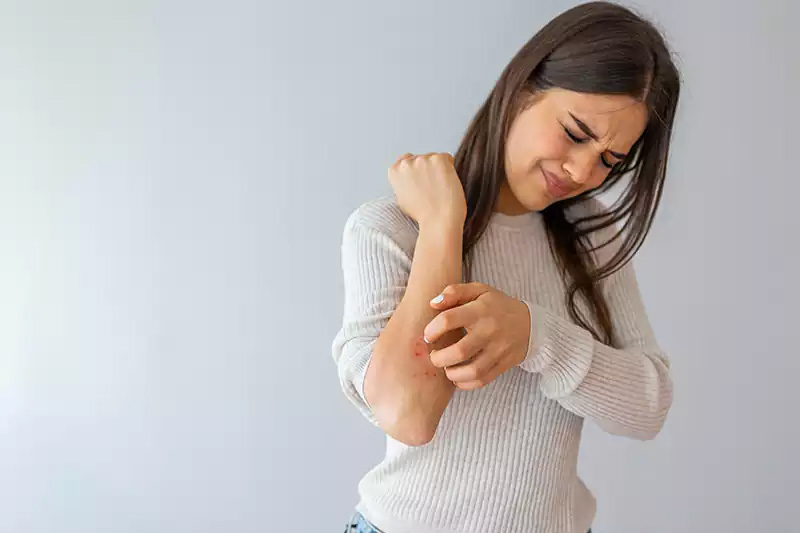Eczema and Psoriasis
Despite the confusingly similar appearances between eczema and psoriasis, some clues can help you tell them apart.
Genetics, Environment or Autoimmune:
The most significant difference between eczema and psoriasis are the root causes. Psoriasis is an autoimmune disease that makes your immune system dysfunctional, and the skin cells grow too quickly. The cells pile up on the top of the skin, forming a white scale. The cause of eczema is more complicated and difficult to determine. Both genetic and environmental factors might play a role in triggering a rash.
Studies have found that in some eczema patients, a gene that creates a protective layer on top of the skin has mutated (changed), that makes the skin prone to flare and infection. Climate may also play a role — people who live in a dry climate or city where they are exposed to pollutants tend to have dry skin.
Subtle Differences in Itchiness
Psoriasis tends to cause mild itching and, in some cases, a horrible burn. Whereas eczema, can lead to severe itching. When it begins to get severe, some people might scratch their skin so hard that leads to bleeding. Both these skin diseases can occur anywhere on the body.
Psoriasis causes trouble generally on the:
- Scalp
- Face
- Elbows
- Knees
- Buttocks
Eczema can occur in these places, but it usually inflames the skin on the back of the knees or inside the elbows. Although one can get either disease at any age, eczema affects children more than psoriasis.
Sunlight Can Ease Psoriasis but Not Necessarily Eczema
If one has eczema, summer might not be their ideal weather. Certain people who have eczema are sensitive to hot weather. In summer, overheating may cause sweat, which can lead to a flare-up of the skin. “However, for most people with psoriasis, abundant natural ultraviolet B (UVB) light from the sun can be a blessing. UVB light slows down the unusual growth of the skin cells. This UVB light is used as a medical treatment for psoriasis. But one should remember too much of a good thing can be damaging. If a person goes sunbathing without applying sunscreen or are exposed to sunlight for a long time, the overexposure may trigger psoriasis symptoms. If one starts to feel itchy or notice red spots, they should immediately leave the area. It is best to ask a dermatologist about the best amount of time for sun exposure.
Getting Treated
Suppose one has itchy, red patches on any part of the body that don’t go away with over-the-counter medications. In that case, it’s better to consult a dermatologist. Primary care provider can also make a diagnosis and manage the symptoms. Still, a dermatologist has specialized training and rich experience in recognizing subtleties of the two skin problems. The treatments for eczema and psoriasis are usually similar. Some of the conventional treatments are:
- Over-the-counter relief: Most of these products are aimed to help relieve symptoms or prevent infections.
- Topicals: The doctor prescribes these medications to apply on the affected skin.
- Phototherapy: Phototherapy is also called light therapy. Phototherapy uses a machine to create the UVB light. Phototherapy is safe. The patient will be exposed to a healthy and controlled amount of UVB light. The procedure is performed under medical supervision, and it can reduce itching and inflammation, and boost the bacteria-fighting ability of the skin.
- Biologics: Biologics are drugs that target the protein that causes you to have an inflammatory response. They are usually administered by an injection or intravenous (IV) infusion.
- Systemics: These are drugs that are taken orally to control the immune system’s response and reduce inflammation. It’s usually prescribed in a severe condition.
Eczema and psoriasis can occur differently in each person. Comparing your symptoms to another person won’t always give you the right answer. Consult the dermatologist for a proper diagnosis and treatment.





